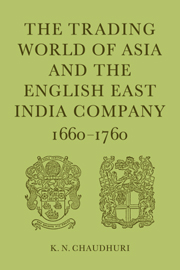Book contents
- Frontmatter
- Contents
- Tables
- Figures
- Maps
- Abbreviations
- Notes on dates, contemporaneous spellings, currency, and weights
- Preface
- Acknowledgements
- 1 The international economy and the East India trade
- 2 A formal theoretical model of the East India Company's trade
- 3 The structure of early trade and the pattern of commercial settlements in Asia
- 4 The evolution of the Company's trading system: operation and policy 1660–1760
- 5 Long-term trends and fluctuations 1660–1760
- 6 Politics of trade
- 7 Markets, merchants, and the Company
- 8 The export of treasure and the monetary system
- 9 The structure of country trade in Asia
- 10 Export of European commodities
- 11 The Company and the Indian textile industry
- 12 The Company's trade in textiles
- 13 Pepper
- 14 Import of bulk goods
- 15 Raw silk
- 16 Coffee
- 17 Imports from China
- 18 Financial results
- 19 Conclusion
- APPENDICES
- General glossary
- Bibliography
- Short titles cited in the reference notes
- Notes
- Index
17 - Imports from China
Published online by Cambridge University Press: 06 July 2010
- Frontmatter
- Contents
- Tables
- Figures
- Maps
- Abbreviations
- Notes on dates, contemporaneous spellings, currency, and weights
- Preface
- Acknowledgements
- 1 The international economy and the East India trade
- 2 A formal theoretical model of the East India Company's trade
- 3 The structure of early trade and the pattern of commercial settlements in Asia
- 4 The evolution of the Company's trading system: operation and policy 1660–1760
- 5 Long-term trends and fluctuations 1660–1760
- 6 Politics of trade
- 7 Markets, merchants, and the Company
- 8 The export of treasure and the monetary system
- 9 The structure of country trade in Asia
- 10 Export of European commodities
- 11 The Company and the Indian textile industry
- 12 The Company's trade in textiles
- 13 Pepper
- 14 Import of bulk goods
- 15 Raw silk
- 16 Coffee
- 17 Imports from China
- 18 Financial results
- 19 Conclusion
- APPENDICES
- General glossary
- Bibliography
- Short titles cited in the reference notes
- Notes
- Index
Summary
The tea trade
The spread of the tea-drinking habit in Europe during the early years of the eighteenth century was an astonishingly rapid process in the assimilation of a new economic product. Its diffusion was easily comparable to the adoption of Indian cotton textiles in the seventeenth century, and the complementarity of tea and sugar probably explains the relative decline of pepper in household budgets. Pepper was no longer a prestigious high-cost commodity; money spent on it competed with other attractive alternatives. The greater availability of sugar supplies from the West Indian plantations and the decline in its cost provided the context in which the mass consumption of tea could become a reality. For people in the lower income groups, tea as a beverage was appealing not only for its intrinsic taste and quality but also as a means of taking sugar. The relationship between the two products was so close that a pamphlet printed in 1744, at the request of the tea dealers, attempted to estimate the total English consumption of tea from the known consumption of sugar. The argument was ingenious, even though the calculations were largely based on guesswork. By taking the total consumption of sugar at 800000 cwt and establishing the appropriate coefficients, the author concluded that on an average two million pounds of tea were drunk every year in England. This was a figure comfortably in excess of the quantities legally imported by the English East India Company and pointed to the widespread and dangerous prevalence of smuggling.
- Type
- Chapter
- Information
- The Trading World of Asia and the English East India Company1660-1760, pp. 385 - 410Publisher: Cambridge University PressPrint publication year: 1978



